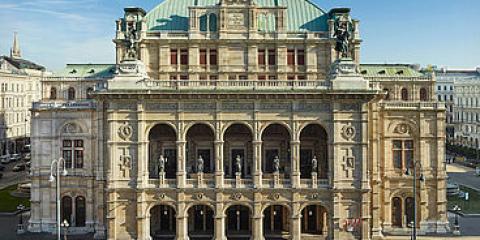-
Opernring 11010 Wien
Animal Farm State Opera Vienna - Wien Fri 12.Jun 2026 replace me !Animal Farm State Opera Vienna - Wien Tue 16.Jun 2026 replace me !Animal Farm State Opera Vienna - Wien Thu 18.Jun 2026 replace me !Animal Farm State Opera Vienna - Wien Tue 23.Jun 2026 replace me !The audience can expect an opera based on Orwell's classic dystopia about a failing struggle for liberation.
On a neglected farm, the animals revolt against their tyrannical owner. After some time, however, they are forced to submit to the yoke of a new leader from their own ranks.
Raskatov worked intensively with the experienced librettist and dramaturge Ian Burton. It was important to him to combine Orwell's external view of the Soviet empire with internal views of the system by incorporating original quotes from Stalin, Trotsky and the head of the secret service Beria, including the latter's sexualized acts of violence. In terms of language, Raskatov pushed for brevity and condensation as well as translating the narrative into situations that were as vivid as possible. For his setting, he developed a »scalpel style« - as he himself calls it - which contours the events sharply and with rich contrasts. Raskatov also works with musical references to the history of his country. The score provides for no fewer than 21 solo roles, which exploit the full spectrum of human vocal ranges and each of which is given a characteristic individual profile.»All animals are equal, but some are more equal.« The first two translations of the fable Animal Farm, a parable about the perversion of the Russian revolution under Stalin's dictatorship, were published in Ukrainian and Polish in 1947, the year it was first published. Of course, they had to be published in Western Europe. But even the English original's chances on the Western book market, which put up passive resistance to the manuscript, were more than questionable for some time. As Orwell noted in the preface to the Ukrainian edition, his satire was not primarily about the Soviet Union, of which he only had knowledge through magazines and books, but about the West's illusions about the socialist miracle kingdom in the East. These illusions implied that the regime's totalitarian excesses of violence - from the show trials and deportations to the mass murders, the Holodomor and the Gulag - were actively suppressed and denied. The fact that a »left-wing« author like Orwell wrote against this uncritical admiration was met with silence and disinterest by the circles that considered themselves advanced. While it was geopolitical and party-political interests (the Soviet Union as an ally in the fight against Hitler's Germany and capitalism) that cemented the cartel of silence in Western societies, in the recent past it has been economic interests. The topicality of Orwell's dystopia thus also proves itself in view of the flagrant re-Stalinization of Russian society since the noughties. In the »post-factual« age of populism, the basic question posed by the book remains pressingly acute, even in the West: how is it possible for popular leaders to use a militant rhetoric of freedom and security to assert ruthless power and self-interest?(Source: wiener-staatsoper.at)
Navigation:
- shopping-cart ({{mainCartInfo.itemCount}})
-
- venues
- Genres
- language:

